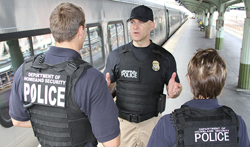Democracy doesn't necessarily predict terrorist attacks, study finds

For decades researchers have considered democratic nations as elevated and vulnerable targets to transnational terrorism, partially because terrorist groups can operate more easily in a free society and plan an attack.
However, a University of Kansas researcher has found that a nation's proximity to an attacker's country of origin and whether a country has experienced an attack before are better predictors of a future terrorist attack than a country's regime type, democratic or not.
"It sounds rather pessimistic that once a country becomes a hotbed of inviting transnational incidents that that continues to be the case," said Nazli Avdan, assistant professor of political science. "However, the results also shed new light on the vulnerability of democracies to terrorist attacks. Democracy may be influential in why countries are targeted, but it is not significantly related to the risk of terrorism."
Instead, because geographic proximity and the frequency of attacks are the most important indicator, that can help guide anti-terrorism policy decisions, she said.
"It basically sheds light on why policy makers prefer to be more vigilant and prepared," said Avdan, who was the corresponding author of the study "Democracies at Risk? A Forecasting Analysis of Regime Type and the Risk of Terrorist Attack," published in December in the journal Conflict Management and Peace Science.
As part of the study Avdan and lead author Christopher Gelpi, a professor of political science at The Ohio State University, attempted to use specific statistical forecasting techniques to provide insight into how policymakers craft anti-terrorism measures, such as border security, surveillance, airport screening and others.
Their model of prediction also tended to overshoot the number of actual transnational terrorist attacks in order to account for attacks that actually occurred in 132 different countries from 1968 to 2007, as contained in International Terrorism: Attributes of Terrorist Events data. France at 148 incidents and the United States at 102 incidents had the most frequent attacks during those decades, Avdan said.
A majority of those attacks occurred during the Cold War era, she said. Overall, terrorist attacks are relatively rare events and hard to predict.
As far as the forecasting of attacks, Avdan said the study's results provide insight into the minds of policymakers who perhaps advocate for more strict security measures for all citizens—including ones who could carry allegations of infringement on civil liberties—because they would rather err on the side of a false positive to prevent a terrorist attack instead of being too lax and an attack occurring.
"When it's policymakers, they don't really care about these false-positive predictions and tactics and measures such as screening a massive number of airline travelers who are actually innocent and have nothing to do with terrorism," Avdan said. "It basically shows that this is the reason policymakers are willing to tolerate regardless of what the public thinks, these types of policies that are designed to incur false positives."
Regarding whether democracy and wealth or both can be a decent predictor of terrorist attacks, the researchers were unable to find that either made a difference alone or jointly, Avdan said.
This might be because indicators of democracy are not granular and don't change much over time, she said.
"That means our findings are likely more relevant for the State Department, which is focused on longer-term strategic planning," Avdan said, "than the Department of Homeland Security, which might require more precision in predicting attacks."
The researchers instead found the only variables with statistical significance were proximity to a terrorist's country of origin and time elapsed since the previous attack on a country.
"Terrorism is a short gun as far as distance. Basically this does go back to providing rationale for hypervigilance, in saying that yes, if you witness an attack, you are likely to witness it again," Avdan said. "That basically supports overshooting in terms of policy in order to try to catch that one true positive attack, you have to incur false positives as well, basically being prepared at all times."
Future research likely should focus on more granular data seeking to narrow down more precise locations or regions within countries of transnational terrorist attacks, she said. Also, seeking to predict the types of violence tactics terrorist groups use in attacks would be valuable.
Provided by University of Kansas
















